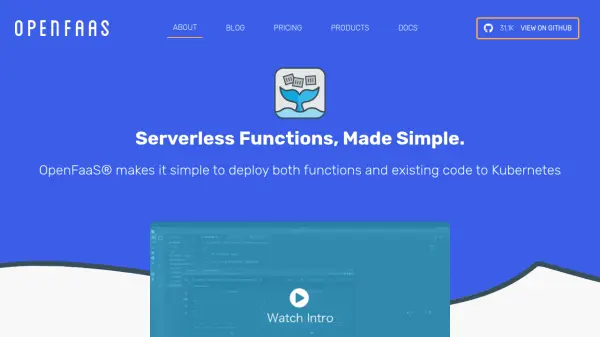What is OpenFaaS?
OpenFaaS provides a powerful platform for deploying serverless functions and existing microservices to Kubernetes clusters both on-premises and in the cloud. The platform is designed for simplicity and flexibility, allowing users to write functions in any programming language utilizing pre-built templates or their own custom templates, and deploy them as portable container images. With support for event-driven workloads, autoscaling (including scaling to zero), advanced monitoring, and seamless integration with popular messaging systems like Kafka, GCP Pub/Sub, and AWS SQS/SNS, OpenFaaS is well-suited to handling production workloads at any scale.
OpenFaaS offers tiered solutions including a free Community Edition for personal or experimental use, a Standard plan for production-ready deployments, and an Enterprise plan with enhanced features such as multi-tenancy, Single Sign-On, RBAC, audit capabilities, and premium support. It is trusted by leading organizations for use cases ranging from ETL pipelines to multi-tenant SaaS platforms, facilitating faster feature releases and efficient Kubernetes management for both developers and enterprises.
Features
- Multi-Language Support: Write functions in any programming language using pre-built or custom templates.
- Portable Deployments: Deploy serverless functions in containers to any Kubernetes cluster, both on-premises and in the cloud.
- Autoscaling: Scale functions automatically including to zero, based on demand and custom metrics.
- Event-Driven Triggers: Support for invoking functions via events from Kafka, AWS SQS/SNS, GCP Pub/Sub, RabbitMQ, Postgresql, Cron, and MQTT.
- Production-Ready Management: Includes RBAC, Single Sign-On, advanced dashboards, and fine-tuned scaling options in Pro and Enterprise editions.
- Monitoring & Observability: Grafana dashboards for metrics, function health, retries, and concurrency.
- REST API Management: Manage functions, secrets, logs, and namespaces via a robust RESTful API.
- Multi-Tenancy: Secure namespace isolation and resource limits for enterprise environments.
Use Cases
- Deploying serverless functions in Kubernetes environments
- Building scalable microservices architectures
- Running ETL and data pipelines with automatic scaling
- Enabling customer extensibility or sandboxed function execution in SaaS products
- Integrating event-driven processing with message queues and schedules
- Batch job automation and ML model deployment
FAQs
-
What programming languages are supported for writing functions in OpenFaaS?
OpenFaaS functions can be written in any programming language with official templates available for Go, Java, Python, C#, Ruby, Node.js, PHP, and users can also create their own templates. -
Can OpenFaaS be deployed both on-premises and in the cloud?
Yes, OpenFaaS supports deployment to any Kubernetes cluster, either on-premises or in the cloud, providing a unified experience regardless of infrastructure. -
Does OpenFaaS offer multi-tenancy and secure isolation for enterprise use?
Yes, OpenFaaS Enterprise supports multi-tenancy, secure function isolation, dedicated namespaces, and RBAC policies for enterprise deployments. -
How does OpenFaaS handle autoscaling?
OpenFaaS features fine-tuned autoscaling, including the ability to scale functions to zero during idle periods and scale up based on custom metrics such as RPS, CPU, or capacity. -
Is OpenFaaS suitable for production workloads?
OpenFaaS Standard and Enterprise editions are designed for production use, with enhanced features, support, and robust management tools for critical workloads.
Related Queries
Helpful for people in the following professions
OpenFaaS Uptime Monitor
Average Uptime
100%
Average Response Time
88.77 ms
Featured Tools
Join Our Newsletter
Stay updated with the latest AI tools, news, and offers by subscribing to our weekly newsletter.





